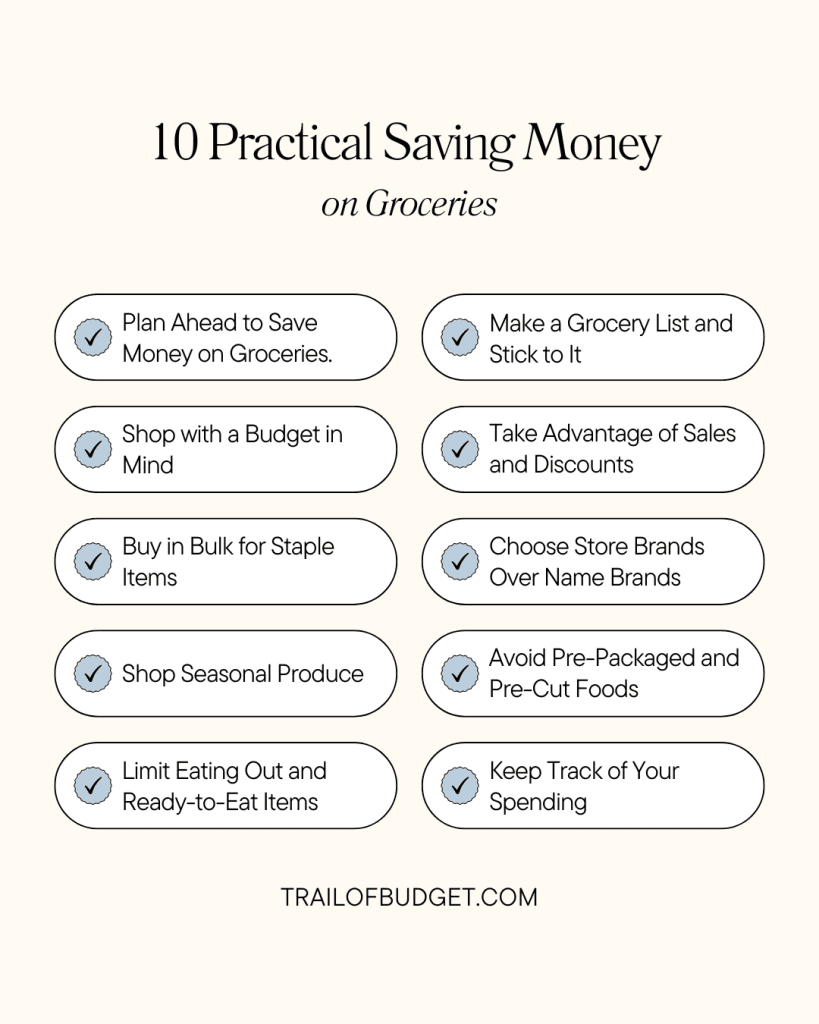Table of Contents
Introduction:
Groceries are a necessary expense, but they don’t have to break your budget. With a little planning and strategy, you can save money on groceries without sacrificing the quality of your meals. Whether you’re trying to cut costs or free up cash for other financial goals, these practical tips will show you how to master saving money on groceries while staying satisfied and healthy.

1.Plan Ahead to Save Money on Groceries.
Meal planning is a game-changer when it comes to saving money on groceries. By deciding what to cook for the week, you can create a precise shopping list that eliminates impulse purchases. Focus on ingredients that can be used in multiple meals to reduce waste and save money on groceries while maximizing value.
2.Make a Grocery List and Stick to It
A well-thought-out grocery list helps you stay organized and avoid overspending. Write down everything you need and stick to your list while shopping. This simple habit ensures that you buy only what’s necessary, keeping your grocery bill in check.
3.Shop with a Budget in Mind
Before heading to the store, set a clear budget for your grocery shopping trip. Knowing your spending limit will help you make mindful choices and save money on groceries by resisting the temptation of unnecessary items.
4.Take Advantage of Sales and Discounts
Keep an eye out for weekly sales, coupons, and promotions at your local stores. Apps like Flipp and Honey can also help you find discounts and cashback opportunities. Stock up on non-perishable essentials when they’re on sale, but avoid buying items you don’t need just because they’re discounted.
5.Buy in Bulk for Staple Items
Purchasing items like rice, pasta, and canned goods in bulk can save you money in the long run. Look for bulk stores or wholesale clubs in your area to get the best deals. Just be sure to avoid buying perishables in large quantities if you’re unlikely to use them before they spoil.
6.Choose Store Brands Over Name Brands
Many store-brand products offer the same quality as name-brand items but at a lower price. Compare labels and give store brands a try—you might be surprised by the savings and the quality.
7.Shop Seasonal Produce
Seasonal fruits and vegetables are usually more affordable and fresher than out-of-season options. Visit local farmers’ markets or look for seasonal deals in your supermarket to save money on fresh produce.
8.Avoid Pre-Packaged and Pre-Cut Foods
Convenience comes at a cost. Pre-packaged and pre-cut fruits, vegetables, and meals are significantly more expensive than their whole counterparts. Taking a little extra time to prepare your food at home can lead to big savings.
9.Limit Eating Out and Ready-to-Eat Items
Cooking at home is almost always more cost-effective than eating out or buying ready-to-eat meals. Reserve eating out for special occasions, and focus on preparing simple, delicious meals at home.
10.Keep Track of Your Spending
Review your grocery receipts regularly to identify areas where you might be overspending. Use budgeting apps to monitor your expenses and adjust your shopping habits as needed. Tracking your spending helps you stay accountable and aware of your progress.
Conclusion:
Implementing these strategies to save money on groceries can significantly reduce your expenses and help you stay on track financially By implementing these tips for budget-conscious shoppers, you can stretch your dollar further while enjoying delicious, wholesome meals. Start small and gradually adopt these habits into your routine to see a noticeable difference in your grocery budget. Remember, every dollar saved on groceries is a step closer to achieving your financial goals.
By following these simple strategies, you can start saving money on groceries and make more room in your budget for other important financial goals. For further tips on efficient grocery shopping and meal planning, check out this guide on food shopping and meal planning from Nutrition.gov.
For more strategies to manage your finances, read our Budgeting Basics Guide

